Thesaurus : Doctrine

► Full Reference: S. Pottier, "In Favour of European Compliance, a Vehicle of Economic and Political Assertion", in M.-A. Frison-Roche (ed.), Compliance Monumental Goals, Journal of Regulation & Compliance (JoRC) and Bruylant, "Compliance & Regulation" Serie, 2023, pp. 459-468
____
📘read a general presentation of the book, Compliance Monumental Goals, in which this article is published
____
► Summary of the article (donne by the Journal of Regulation & Compliance - JoRC): Today's monumental goals, particularly environmental and climatic ones, are of a financial magnitude that we had not imagined but the essential stake is rather in the way of using these funds, that is to determine the rules which, to be effective and fair, should be global. The challenge is therefore to design these rules and organize the necessary alliance between States and companies.
It is no longer disputed today that the concern for these monumental goals and the concern for profitability of investments go hand in hand, the most conservative financiers admitting, moreover, that concern for others and for the future must be taken into account, the ESG rating and the "green bonds" expressing it.
Companies are increasingly made more responsible, in particular by the reputational pressure exerted by the request made to actively participate in the achievement of these goals, this insertion in the very heart of the management of the company showing the link between compliance and the trust of which companies need, CSR also being based on this relationship, the whole placing the company upstream, to prevent criticism, even if they are unjustified. All governance is therefore impacted by compliance requirements, in particular transparency.
Despite the global nature of the topic and the techniques, Europe has a great specificity, where its sovereignty is at stake and which Europe must defend and develop, as a tool for risk management and the development of its industry. Less mechanical than the tick the box, Europe makes the spirit of Compliance prevail, where the competitiveness of companies is deployed in a link with States to achieve substantial goals. For this, it is imperative to strengthen the European conception of compliance standards and to use the model. The European model of compliance arouses a lot of interest. The duty of vigilance is a very good example. It is of primary interest to explain it, develop it and promote it beyond Europe.
________
April 27, 2024
Interviews

► Full reference: E. Silva-Romero, "Droit de la Compliance : Arbitrage International et géopolitique" ("Compliance Law: International Arbitration and Geopolitics"), interview conducted by M.-A. Frison-Roche as part of a series of interviews on Compliance Law, in Fenêtres ouvertes sur la gestion (Open windows on management), broadcast by J.-Ph. Denis, Xerfi Canal, recorded December 12, 2023, recorded April 27, 2024
____
🌐consult the presentation of Eduardo Silva-Romero's interview on LinkedIn
____
🎥view the full interview on Xerfi Canal
____
► Starting point: In 2023, Eduardo Silva-Romero wrote a contribution:📝What place is there for compliance in investment arbitration?, in the book 📘Compliance Jurisdictionalisation
🧱read the presentation of this contribution ➡️click HERE
____
► Summary of interview:
Marie-Anne Frison-Roche. Question: What is the place of Compliance in international investment arbitration and, first of all, what is its specificity?
Edouardo Silva-Romero. Answer: International investment arbitration is based on a treaty, generally signed between two States, which agree to protect the investments that companies make in the host State. The resulting disputes may give rise to this specific type of arbitration.
Compliance has a special place here, because if the investment is tainted by corruption or fails to respect human rights, it will not be protected by the arbitrators, as the host state is no longer bound.
____
MaFR. Q.: So, through Compliance, states can assert their sovereignty?
E.S-R. A.: Yes, through the social dimension of Compliance, States can assert their social conception and impose it in investment arbitration.
____
MaFR. Q.: Is the attractiveness of the Paris marketplace enhanced?
E.S-R. A.: The International Court of Arbitration is headquartered in Paris, and it's clear that this presence, combined with Compliance's humanistic approach to investment arbitration, is an essential element of attractiveness. Because of the technicalities involved, it is essential for international arbitrators to master compliance law in order to participate in this new element of attractiveness, as it takes the form of rules of public order, and this is also how the Paris Court of Appeal exercises its control over awards.
________

Feb. 9, 2024
Organization of scientific events
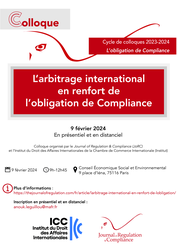
🌐follow Marie-Anne Frison-Roche on LinkedIn
🌐subscribe to the Newsletter MAFR Regulation, Compliance, Law
____
► Full Reference: L. Aynès, M.-A. Frison-Roche, J.-B. Racine and E. Silva-Romero (dir.), L'arbitrage international en renfort de l'obligation de Compliance (International Arbitration in support of the Compliance Obligation), Journal of Regulation & Compliance (JoRC) and Institute of World Business Law of the ICC (Institute), Conseil Économique Social et Environnemental (CESE), Paris, February 9, 2024
____
____
🏗️This symposium takes place in the cycle of symposiums organised by the Journal of Regulation & Compliance (JoRC) and its partners Universities, focusing in 2023-2024 on the general theme of the Compliance Obligation
____
📚The works will then be inserted in the books:
📕L'obligation de Compliance, to be published in the 📚Régulations & Compliance Serie, co-published by the Journal of Regulation & Compliance (JoRC) and Dalloz, published in French.
📘Compliance Obligation, to be published on the 📚Compliance & Regulation Serie, co-published by the Journal of Regulation & Compliance (JoRC) and Dalloz, published in English.
____
► General presentation of the symposium: "Compliance Obligation" appears to be far from International Arbitration if Compliance Law is only understood in terms of binding regulations or even Criminal Law. Arbitration would only have contact with Compliance Obligation in a repulsive way, when a person claims to have enforced a contract before an arbitration court that disregards a compliance prohibition, e.g. corruption or money laundering. It is therefore from a negative angle that the cross-over has taken place.
The fact that Arbitration Law respects the requisite of Criminal Law is nothing new. Moreover, the power of Compliance in its detection and prevention tools, particularly in terms of evidence, no doubt increases the global efficiency.
But Compliance Obligation is based on Monumental Goals, notably linked to global human rights and active ambitions about environment and climate which, particularly in the value chain economy, take the legal form of compliance clauses, or even compliance contracts, or various commitments and plans, which the parties can ask the international arbitrator to enforce. They will do so even more as arbitrators are often the only international, or even global, judges available.
The use they will do of Contract Law, Quasi-Contract Law, Enforcement Law, Tort Law, reinforces Compliance Law in a global dimension.
____
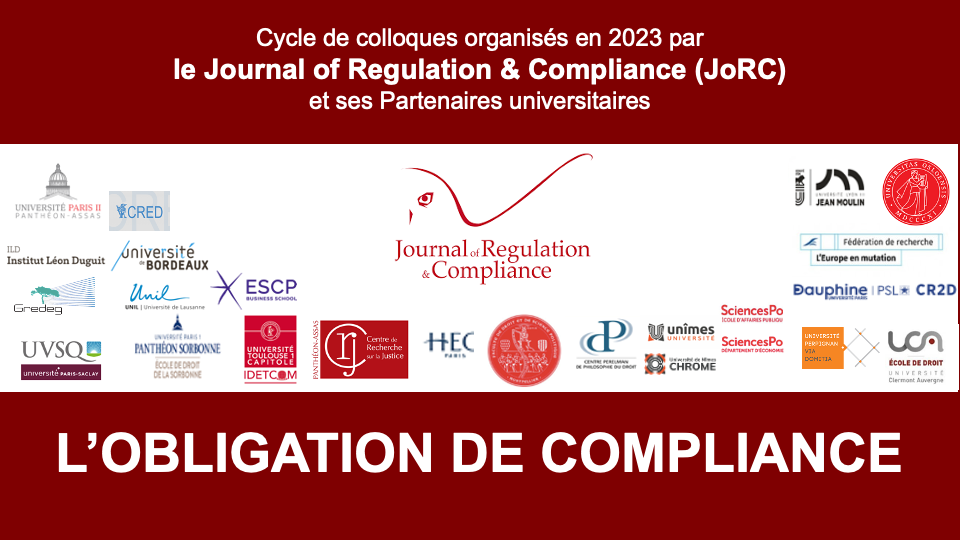
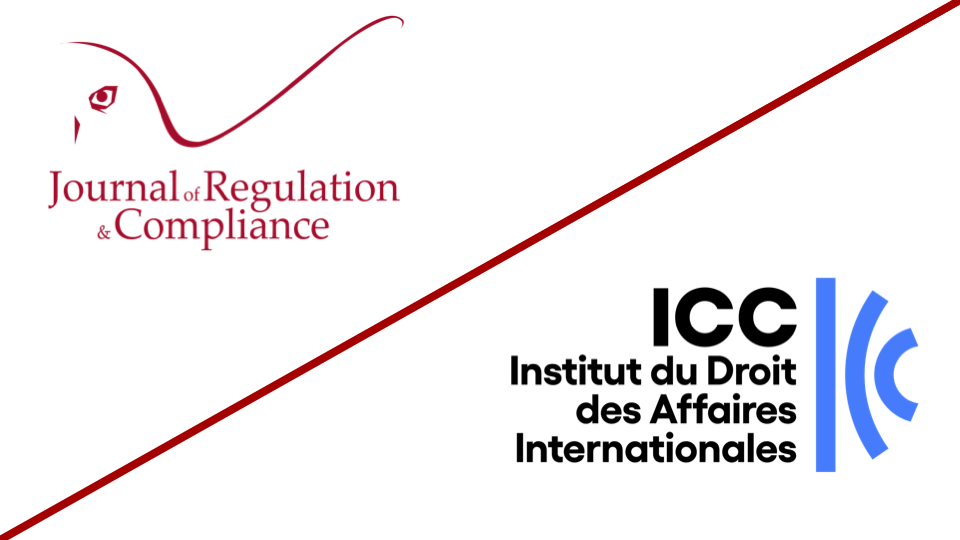
____
► Interviennent :
🎤 Laurent Aynès, emeritus Professor at Paris 1 Panthéon-Sorbonne University, Attorney, Darrois Villey Maillot Brochier (Paris)
🎤 Marie-Anne Frison-Roche, Professor of Regulatory and Compliance Law, Director of the Journal of Regulation & Compliance (JoRC)
🎤 Jean-François Guillemin, former General Secretary of the Bouygues Group
🎤 Christophe Lapp, Attorney, Advant Altana (Paris)
🎤 Jean-Baptiste Racine, Full Professor at Paris Panthéon-Assas University (Paris 2)
🎤 Eduardo Silva-Romero, President of the Institute of World Business Law of the ICC (Institute), Attorney, Wordstone (Paris)
____
🧮Read a detailed presentation of the event below⤵️
Dec. 12, 2023
Conferences

► Référence complète : M.-A. Frison-Roche, enregistrement et animation d'une série d'entretiens sur le Droit de la Compliance, in J.-Ph. Denis, Fenêtres ouvertes sur la gestion, Xerfi Canal, tenus le 12 décembre 2023, diffusés en 2024.
____
► Présentation générale de la série, comprenant les entretiens successifs : 🧱Compliance - un sujet de choix pour nouer Droit et Gestion : La distinction des disciplines est justifiée, le droit d'une part, la gestion d'autre part : c'est maltraiter la réalité que, notamment, de dissoudre l'une dans l'autre (ce que Jankélévitch appelait "la réduction par déplacement d'une discipline") car chacune doit conserver son ancrage.
Ceci posé, parce que la réalité ne se construit suivant les disciplines, si l'on veut rendre compte de celle-ci, ou au moins en tenir compte, par exemple de la réalité des entreprises, il faut que les disciplines se croisent.
La compliance est un parfait terrain pour cela.
Merci à Jean-Philippe Denis, professeur de gestion, qui est depuis toujours ouvert à ce dialogue, de l'avoir concrétisé plus encore, en permettant une série d'interviews à la croisée du Droit et de la Gestion sur le média Xerfi Canal.
____
Dans un premier temps, 4 discussions ont été tenues entre Jean-Philippe Denis et moi-même sur les thèmes suivants :
- 🎬sur la nécessité pratique de faire converger l'analyse juridique et l'analyse de gestionnaire lorsqu'il s'agit de comprendre, maîtriser, promouvoir la compliance.
- 🎬sur l'existence de différents systèmes de compliance selon les zones du mondes
- 🎬sur la "civilisation" de la Compliance
- 🎬sur le fait que la Vigilance est la pointe avancée de la Compliance (diffusé le 13 juin 2024) : cliquer ICI
Puis, dans un second temps
- 🎬avec 🕴️Jean-Baptiste Racine sur la manière dont l'arbitrage international est apte aujourd'hui à défendre les Buts Monumentaux de la Compliance, notamment les droits humains et les impératifs environnementaux.
- 🎬avec 🕴️Stanislas Pottier de la façon dont les entreprises intègrent cet impératif de compliance, notamment dans sa dimension environnementale, participent à la construction européenne par cette voie, et arrivent à faire connaissance avec ce personnage assez nouveau pour elle, au moins en France : le juge (diffusé le 27 avril 2024) : cliquer ICI
- 🎬 avec 🕴️Roch-Olivier Maistre du rôle que joue l'Arcom dans le nouveau système numérique qui se met en place, et quelle articulation se noue entre la Régulation et la Compliance, notamment pour mesurer en quoi la Compliance est un outil utile pour assurer une meilleure supervision des plateformes en ligne et lutter ainsi plus efficacement contre les phénomènes de manipulation de l’information et de haine en ligne (diffusé le 16 mars 2024) : cliquer ICI
- 🎬avec 🕴️Eduardo Silva-Romero de l'importance grandissante de l'arbitrage international pour les entreprises, arbitrage qui intègre les intérêts des États et répond aux impératifs de Compliance (diffusé le 27 avril 2024) : cliquer ICI
- 🎬avec 🕴️Christophe Lapp de la nécessité pratique de ne pas confondre la Compliance avec la simple conformité, notamment lorsque le juge est saisi, les Buts Monumentaux étant intégrés dans son raisonnement (diffusé le 3 février 2024) : cliquer ICI
- 🎬avec 🕴️Jacques Beyssade du rapport entre la gouvernance et la Compliance, illustré dans une banque mutualiste et plus particulièrement dans le recrutement et la promotion des femmes à des postes de responsabilité (diffusé le 24 février 2024) : cliquer ICI
____
____
🔓consulter ci-dessous une présentation de chaque interview mené avec un expert en Droit sur un sujet particulier de Droit de la Compliance⤵️
Sept. 1, 2022
Thesaurus : Doctrine

► Full Reference: S. Pottier, "Pour une compliance européenne, vecteur d’affirmation économique et politique" ("For European compliance, a vector of economic and political affirmation"), in M.-A. Frison-Roche (ed.), Les Buts Monumentaux de la Compliance, coll. "Régulations & Compliance", Journal of Regulation & Compliance (JoRC) and Dalloz, 2022, p. 475-482.
____
📕read a general presentation of the book, Les Buts Monumentaux de la Compliance, in which this article is published
____
► Summary of the article (donne by the Journal of Regulation & Compliance): Today's monumental goals, particularly environmental and climatic ones, are of a financial magnitude that we had not imagined but the essential stake is rather in the way of using these funds, that is to determine the rules which, to be effective and fair, should be global. The challenge is therefore to design these rules and organize the necessary alliance between States and companies.
It is no longer disputed today that the concern for these monumental goals and the concern for profitability of investments go hand in hand, the most conservative financiers admitting, moreover, that concern for others and for the future must be taken into account, the ESG rating and the "green bonds" expressing it.
Companies are increasingly made more responsible, in particular by the reputational pressure exerted by the request made to actively participate in the achievement of these goals, this insertion in the very heart of the management of the company showing the link between compliance and the trust of which companies need, CSR also being based on this relationship, the whole placing the company upstream, to prevent criticism, even if they are unjustified. All governance is therefore impacted by compliance requirements, in particular transparency.
Despite the global nature of the topic and the techniques, Europe has a great specificity, where its sovereignty is at stake and which Europe must defend and develop, as a tool for risk management and the development of its industry. Less mechanical than the tick the box, Europe makes the spirit of Compliance prevail, where the competitiveness of companies is deployed in a link with States to achieve substantial goals. For this, it is imperative to strengthen the European conception of compliance standards and to use the model. The European model of compliance arouses a lot of interest. The duty of vigilance is a very good example. It is of primary interest to explain it, develop it and promote it beyond Europe.
________
Sept. 1, 2022
Thesaurus : Doctrine

► Full Reference: F. Marty, "L'apport des programmes de conformité à la compétitivité internationale : une perspective concurrentielle" ("The contribution of compliance programmes to international competitiveness: a competitive perspective"), in M.-A. Frison-Roche (ed.), Les Buts Monumentaux de la Compliance, coll. "Régulations & Compliance", Journal of Regulation & Compliance (JoRC) and Dalloz, 2022, p. 381-400.
____
📕read a general presentation of the book, Les Buts Monumentaux de la Compliance, in which this article is published
____
► Summary of the article (done by the Journal of Regulation & Compliance): The author analyzes economically the question of whether the compliance programs set up to respect competition rules are for the sole purpose of avoiding sanctions or also contribute to the goal of increasing the international economic performance of companies. which submit to them.
The author explains that companies integrate by duplication external standards to minimize the risk of sanctions, developing a "culture of compliance", which produces their competitiveness increase and the effectiveness of the legal and economic system. In addition, it reduces the cost of investment, which increases the attractiveness of the company.
In this, this presentation based on the postulate of the rationality of companies and investors, compliance programs can fall under self-regulation. The duplication of the law that they operate takes place largely according to "procedural" type methods.
________
Aug. 24, 2020
Newsletter MAFR - Law, Compliance, Regulation

Full reference: Frison-Roche, M.-A., The control by regulator of the essential infrastructure manager's investment plan: example of electric network and the notion of "doctrine", Newsletter MAFR - Law, Compliance, Regulation, 24th of August 2020
Read by freely subscribing other news of the Newsletter MAFR - Law, Compliance, Regulation
Summary of the news
On 31st of July 2020, the Commission de Régulation de l'Energie (CRE and French energy regulator) has examined the investment plan of the French electric network manager (RTE) as it does every year. This investment plan is an economic document but it also contains societal purposes, especially the adaptation of the electric network in order to integrate renewable energies.
The control by the CRE is not a financial control. The crucial operator (RTE) is free to decide the way it wants to manage its budget. The CRE just advices on the financial side by recommending for exemple to be more flexible in its financial strategies. The true CRE's control is about the investment plan's general orientations, the methodology of needs analysis and crucial operator's investment choices which must be aligned with those of the regulator.
Such a control leads to the emergence of an "investment doctrine" from the side of the crucial operator, mixing its own choices and the regulator's guidelines. Beyond this, the elaboration of the investment plan is the result of a true co-writing between the regulator and the firm which discuss together, exchanges points of view and methods. Such a method, expressing a kind of coregulation, could be used in other sectors.
Feb. 13, 2019
Thesaurus : Doctrine
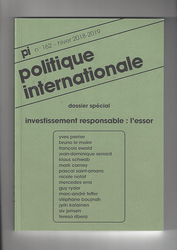
Référence générale : Patrick Wajsman (dir.), Politique internationale, dossier spécial, Investissement responsable : l'essor, n°162, hiver 2018-2019, 119 p.
Consulter le sommaire de la Revue.
Consulter la présentation des entretiens suivants :
Boujnah, S., Places boursières : promouvoir un modèle européen.
Jensen, S., Norvège : exemple d'un fonds souverain éthique.
Ribera, T., Faciliter la transition écologique : ce que peut l'État.
June 18, 2014
Thesaurus : Doctrine
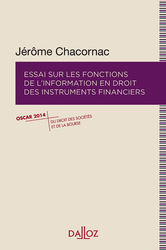
► Référence complète : J. Chacornac, Essai sur les fonctions de l'information en droit des instruments financiers, préf. F. Drummond, Dalloz, Hors collection Dalloz, 2014, 663 p.
____
► Résumé de l'ouvrage (fait par l'auteur) : L’information est au coeur du droit financier. De nombreuses règles imposent de multiples obligations d’information aux émetteurs, aux prestataires de services d’investissement et aux investisseurs. Le droit financier sanctionne en outre les abus de marché, et régit l’élaboration des opinions émises par les analystes financiers et les agences de notation.
Face à un tel amas de normes, au carrefour du droit des sociétés, du droit des contrats et du droit répressif, il est nécessaire de déterminer la cohérence d’ensemble du dispositif à même d’en améliorer l’intelligibilité et d’en maîtriser le développement. À cet égard, les justifications du développement de l’information couramment avancées relèvent davantage des théories financières que du droit, et ne rendent pas compte des difficultés auxquelles se heurtent législateur et juge dans l’élaboration et l’interprétation du droit financier.
La cohérence du traitement juridique de l’information doit alors être recherchée à partir de la nécessité d’informer l’ensemble des acteurs sur le risque inhérent aux instruments financiers.
Le droit financier se construit ainsi en s’appuyant sur ces deux fonctions intellectuelles de l’information : sa fonction descriptive et sa fonction prédictive.
________
Updated: July 31, 2013 (Initial publication: Oct. 4, 2011)
Teachings : Les Grandes Questions du Droit, semestre d'automne 2011

May 11, 2005
Editorial responsibilities : Direction de la collection "Droit et Économie", L.G.D.J. - Lextenso éditions (30)
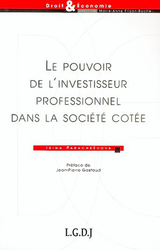
Référence complète : Parachkévova, I., Le pouvoir de l'investisseur professionnel dans la société cotée, préface de Jean-Pierre Gastaud, coll. "Droit et Économie", LGDJ - Lextenso éditions, 2005, 245 p.
Présentation de l'ouvrage : Les rapports entre pouvoir et financement sont à la base de l'organisation de toute société. Néanmoins, la société cotée transforme cette relation qui se diversifie sous l'effet de la segmentation des investisseurs sur le marché.
En pratique, il existe un double rapport pouvoir-financement, altérant les principes classiques. D'une part, le pouvoir se dissocie du financement par l'épargne, ce qui provoque une remise en cause évidente du principe de proportionnalité et de la démocratie « anonyme ». D'autre part, le pouvoir s'associe au financement apporté par les investisseurs professionnels, cette nouvelle connexion entraînant à son tour une déformation du principe de proportionnalité et fragilisant la société.
Comment cette évolution se traduit-elle en droit positif ?
À l'heure actuelle, la dissociation entre pouvoir et financement par l'épargne est prise en compte par une multitude de règles distinctes, en droit des sociétés comme en droit boursier. À l'inverse, l'association spécifique entre pouvoir et financement par les investisseurs professionnels est méconnue, jusque dans son principe même. Il n'existe pas de règles appropriées au rôle particulier joué par l'investisseur professionnel. Il faut donc imaginer et proposer un statut juridique adapté, ouvrant sur un nouveau champ d'application du principe d'égalité entre actionnaires. Celui-ci s'appliquerait non seulement en fonction de la forme juridique de la participation, mais également en fonction du statut économique des porteurs.
Lire la préface de Monsieur le Jean-Pierre Gastaud.
Lire la quatrième de couverture.
Lire la table des matières.
Consulter l'ensemble de la collection dans laquelle l'ouvrage a été publié.